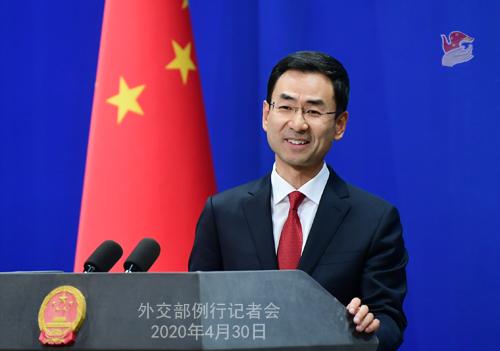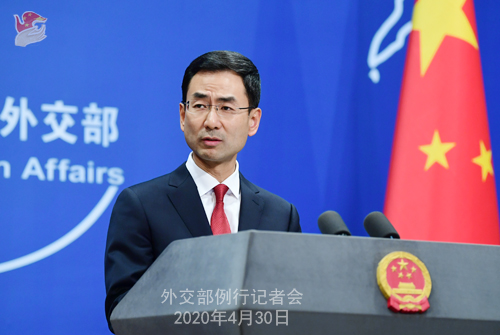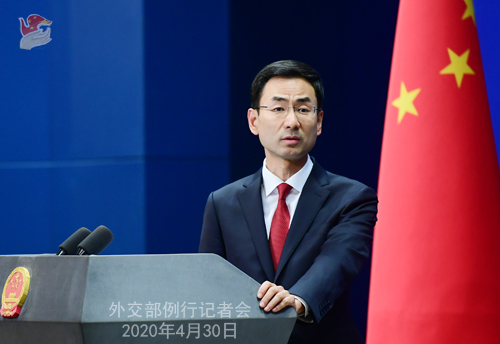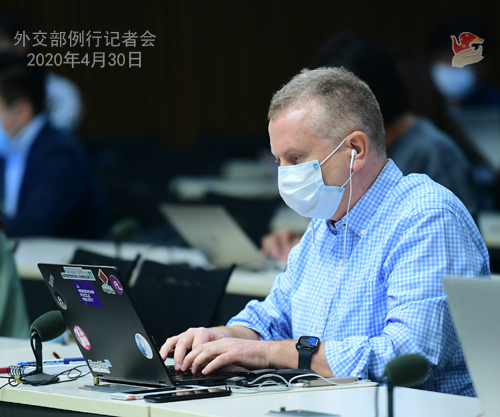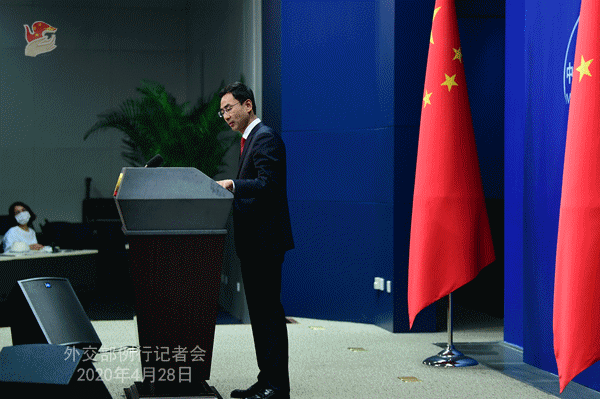| Foreign Ministry Spokesperson Geng Shuang's Regular Press Conference on April 30, 2020 |
| 2020-04-30 22:21 |
|
CCTV: We have noted that at the second meeting of the China-ROK joint response and cooperation mechanism on COVID-19, the two sides announced the establishment of a "fast track" arrangement for travelers on essential and urgent businesses. Could you give us more details? Geng Shuang: Since the outbreak of COVID-19, China and the ROK have always stood together and helped each other. In accordance with the important consensus reached by the heads of state of the two countries, China and the ROK took the lead in setting up a joint response and cooperation mechanism led by the two foreign ministries and involving multiple departments, and strengthened anti-epidemic cooperation with remarkable results. Since the establishment of the mechanism, China and the ROK have continued with the heart-warming cooperation in terms of mutual assistance in epidemic prevention materials, and maintained the record of zero exported case added to each other's caseloads. This has supported the overall anti-epidemic efforts of the two countries and set a good example for international cooperation in fighting the virus. Yesterday China and the ROK held the second video conference of the joint response and cooperation mechanism on COVID-19. The most important outcome was the establishment of a "fast-track" entry system for travelers who have essential and urgent trips to make in the sectors of business, logistics, production and technical services. I would like to give you more details. China and the ROK are important neighbors and partners for economic and trade cooperation. The purpose of the "fast track" entry is to expedite entry for those who are urgently needed for resumption of essential work and production, while ensuring adequate epidemic prevention and control, so as to maintain and develop bilateral economic and trade cooperation and keep the industrial and supply chains of the two countries stable and unimpeded. Both sides believe that this will help better coordinate the two goals of epidemic control and socio-economic development, and also contribute to the stability of regional and global industrial and supply chains. The general principle of the "fast track" arrangement between China and the ROK is reciprocity and mutual benefit, but as the two countries have different requirements in epidemic prevention and control, the specific measures adopted by the two sides on the ground do not have to be exactly the same. Specifically, the "fast track" arrangement will first be applicable to ten Chinese provinces and cities. ROK travelers can apply for visa after applications submitted by their companies are approved. After passing through health-screening and quarantine procedures, they will be quarantined for a shorter period of time in China, and their whole stay in China will be effectively managed, forming a closed loop to ensure safety. Chinese travelers to the ROK who wish to use the "fast track" need to apply for exemption from quarantine when applying for visa from the ROK embassy or consulates in China. If they meet the conditions for approval of the ROK side and test negative for the coronavirus before departing for and after arriving in the ROK, they will be exempted from quarantine and accept flexible epidemic prevention management of the ROK side. As epidemic prevention and control becomes a new normal, the establishment of a "fast track" entry between China and the ROK represents a groundbreaking initiative. The two sides will strengthen communication and coordination, and continue discussing ways to improve and expand the program in light of the situation and the prevention and control policies of the two countries. At present, the situation requires the joint efforts of all countries in the world. China is ready to work with the international community, including the ROK, to further strengthen anti-epidemic cooperation, make contributions to overcoming the virus at an early date, maintaining regional and global public health security and stabilizing the world economy, and jointly build a harmonious and beautiful homeland for mankind. Bloomberg: Just a quick follow-up on that. Do you have other plans or similar programs with other countries? If so, which countries? Geng Shuang: I talked about the latest developments of the "fast track" between China and the ROK. We would like to discuss establishing such "fast track" arrangements with other countries. Against the backdrop of regular epidemic prevention and control, the "fast track" arrangements can help resume work, production, economic growth and the stable functioning of international industrial and supply chains while preventing the resurgence of COVID-19. We are discussing that with some other countries.
CNS: US Secretary of State Pompeo said on April 28 that the world hasn't gained access to the WIV (Wuhan Institute of Virology) to know more about the origin of COVID-19, and he hoped partners of the US will continue asking China to respond. I wonder if you have any comment? Geng Shuang: Regarding some people's rumors on the Wuhan Institute of Virology, Mr. Yuan Zhiming made a thorough statement during his recent interview with Reuters. Mr. Yuan is a researcher at the WIV and director of China's National Biosafety Laboratory. Like Mr. Yuan Zhiming pointed out, there is no evidence to prove that the virus has traces of artificial synthesis. The claim of this virus being synthesized by the WIV is just baseless, because the WIV doesn't have the capability to design and synthesize the virus, and it has never done so. Mr. Yuan also clarified the rumor of "accidental leakage of the virus that was collected from bats", stressing that the lab strictly follows biosafety procedures. I'd like to emphasize that tracing the origin of the virus is a complex matter of science, which should be studied by scientists and professionals. We urge American politicians to stop shifting the blame to China and diverting the attention of the international community. They should be focusing on containing the epidemics at home. Shenzhen TV: Some foreign academicians and media recently said China failed to take effective and timely prevention and control measures at the early stage of the COVID-19 epidemic as it claimed, leading to export of novel coronavirus cases to other countries. How do you respond to that? Geng Shuang: Such allegation runs counter to the facts and utterly disrespects the tremendous efforts and sacrifice made by the Chinese people. In face of the epidemics, as a signatory to the WHO's International Health Regulations, China has taken the most comprehensive, strict and thorough measures in an open, transparent and responsible manner, earnestly fulfilled the duties and obligations and adopted and adjusted border exit health and quarantine measures in a scientific and timely fashion in accordance with the Border Health and Quarantine Law of the People's Republic of China and the Law of the People's Republic of China on Prevention and Control of Infectious Diseases to prevent cross-border transmission. Here I'd like to share the timeline with you all. Since January 3, China has been updating the WHO and relevant countries and regions of the epidemic on a regular basis. The General Administration of Customs of China on the same day issued a document which asked local customs to take targeted border exit health and quarantine measures. On January 20, the NHC issued a notice to classify the novel coronavirus pneumonia as a quarantinable infectious disease according to the Border Health and Quarantine Law of the People's Republic of China and category-B infectious disease according to the Law of the People's Republic of China on Prevention and Control of Infectious Diseases, and take preventive and control measures on the level of a category-A infectious disease. Accordingly, China asked all cross-border travelers to cooperate with the customs in temperature monitoring, medical inspection and screening, and other quarantine measures. Those among travelers going abroad who were confirmed cases, suspected cases, having symptoms and having intimate contact with confirmed cases were transferred to local epidemic control authorities for quarantine and further examination. On January 23, the city of Wuhan suspended outbound transportation including by air and rail. Before that, the Chinese customs already took proper measures to manage outbound travelers with symptoms of fever, who were exhorted to suspend their travel plan or transferred to designated medical institutions for diagnosis and treatment. Since January 23, all ports in China have conducted COVID-19 nucleic acid test on each and every outbound suspected case. China also reported the newly-tested positive cases to the WHO every day so that all countries can assess and study the situation timely. On January 25, the GACC started to launch the health declaration measures by requesting all outbound travelers to declare their health status to health and quarantine officers of China Customs, including their health conditions and history of travel. On January 30, the WHO Director-General declared the COVID-19 outbreak a Public Health Emergency of International Concern, or PHEIC, following a meeting of the International Health Regulations (2005) Emergency Committee. There were only 82 confirmed cases outside China, of which five were in the US and ten in Europe, with no fatality by then. What I detailed is just part of what China has done in an attempt to stem the COVID-19 spread. Since the outbreak, China has been racing against time and the virus by continuously refining and strengthening prevention and control measures. The Chinese government and people have striven to overcome difficulties and made enormous sacrifices to fulfill due obligations to reduce the cross-border spread of the COVID-19 while maintaining anti-epidemic efforts at home. Our important contributions have been well recognized by the international community. As I recall clearly, certain countries that are now hurling groundless accusations against China were actually applauding China's combat against the epidemic not long ago. How could they flip-flop to deny what was kept in public records? Is it because of anything wrong on China's part, or just because they want to hide or fudge anything?
RIA Novosti: To follow up on the "fast track" arrangement between China and the ROK, if I heard correctly, you said those coming from the ROK will be quarantined for a shorter period of time in China. So exactly how many days will they be quarantined? Geng Shuang: It is 14 days now, correct? Follow-up: Yes. Geng Shuang: So now is 14 days. I'm sure the quarantine period will be shorter. I don't have an exact number now, but I think since the policy is to facilitate personnel exchange, the time period will be substantially shortened. It won't make much of a difference if it's only a day or two shorter, right? Reuters: President Trump told Reuters in an interview yesterday that China wants him to lose the election and will do anything they can to make him lose. What is your comment? He also said in the same interview that he's looking into different options in terms of consequences that China may face over its handling of the virus, in response to a question about tariffs and other measures. What's the ministry's comment? Geng Shuang: Regarding the first question, like we said repeatedly, the presidential election is an internal affair of the US. We are not interested in meddling. In the meantime, we hope the US will stop dragging China into its domestic politics. On your second question, I've been answering similar questions lately and sharing a detailed time-line of China's efforts on many occasions. One thing is clear: in an open, transparent and responsible spirit, China has contained COVID-19 at home and made important contribution to the global fight, which is fully recognized and highly commended by the international community. For some time, certain US politicians neglects facts and attempt to shirk their responsibility and hide their incompetence by blaming China. But such attempts, instead of eliminating the progress our people made through arduous efforts, will only expose certain US individuals' malicious intentions and the serious problems in the US. As for "demanding accountability", like we said many times, the virus is a common enemy to all mankind. China is a victim, not an accomplice. As victims hit by the same virus, we have a stake in each other's well-being and should stay united and work together. Certain people in the US should be aware that their enemy is the virus, not China. Faced with a major public health crisis, the international community needs to join hands instead of undercutting others' efforts under various pretexts. The US should also be clear that countries should tide over the difficulties together. Undermining others' endeavors will only end up damaging its own. CNR: Spain's mainstream media like El País and El Mundo have published sensational stories about the quality of China's epidemic prevention materials, saying that the permeability rate of some masks exported by Shandong Garry Galaxy Biotechnology Co.Ltd is so high that they are not up to the standards of surgical masks. Also, the COVID-19 test kits exported by Shenzhen Bioeasy Biotechnology Co.Ltd in Guangdong failed to meet the standards in two rounds of tests. What is China's comment? Geng Shuang: Regarding these exports' quality issue reported by the Spanish media, relevant departments attach great importance to it and have conducted in-depth investigations. The masks exported by Garry Galaxy are for daily protection, thus they are not surgical ones. What Bioeasy Biotechnology exported are COVID-19 antigen test kits. Such products have not been approved by China's National Medical Products Administration due to insufficient verification data, but some products have obtained foreign certification according to the standards of some other countries and have been approved to enter the market. The Chinese companies explained the situation to the purchasing parties in advance, but the latter insisted on the purchase and raised the quality issue afterwards. The Chinese companies fully refunded the advance payment. I would like to reiterate that China attaches great importance to the quality of exports for epidemic prevention and control purpose. Recently, the Ministry of Commerce, together with the General Administration of Customs, the National Medical Products Administration and the State Administration of Market Regulation, has taken a number of measures to ensure orderly export of medical materials and strengthen quality control. Many quality problems appeared because of different standards applied in and outside China, differences in usage habits, and failure to strictly follow instructions for users. China will continue to strictly implement regulatory policies to ensure the quality of epidemic prevention materials. We also hope that the purchasing party will strengthen quality testing during the import process and use the products in strict accordance with the scope of application and operating procedures. In case of any problem, both parties shall settle it properly through consultation following commercial principles.
De Telegraaf: This week the Netherlands trade and investment office in Taipei changed its name into the Netherlands office in Taipei. What's your comment on this issue? Geng Shuang: I understand that the Chinese embassy in the Netherlands has responded to that. You may read their statement. There is only one China in the world, and Taiwan is part of China. China firmly opposes any official ties between the Taiwan region and countries that have diplomatic ties with China, not to mention the establishment of any official agencies in Taiwan. Our position has been clear and consistent. We urge the Netherlands to earnestly abide by the one-China principle, properly handle issues related to Taiwan, correct its wrongdoing and uphold bilateral relations through concrete actions. AFP: Recently the Chinese ambassador to France said in an interview that French correspondents in China always report negative things. Is it the role of an ambassador to criticize the media of the country where he works? Geng Shuang: You asked if Chinese ambassadors have the right to criticize the countries where they work. I don't have a direct comment on that, but I'd like to remind you to read the China-related statements made by European ambassadors in China. I don't know if they are applauding or criticizing China. Frankly, we can accept both as long as they are out of sincerity and aiming to promote bilateral relations between China and the countries they represent. But if they say things out of bias or some bad motives, then their words will be unacceptable to us. Bloomberg: President Trump said in the interview that he was considering various ways to punish the Chinese government. How do you see this consideration specifically? Geng Shuang: As I said in response to a question from Reuters, the COVID-19 is a natural disaster. China, like the US, is a victim of the virus. The victims share the same destiny and should work together to overcome the difficulties. The US should know that its enemy is the virus, not China. At this particular time, they should focus on domestic epidemic control and international anti-epidemic cooperation, rather than attack, smear and shift the blame to China. As for the so-called punishment and accountability, as I recall, we said many times at this podium that there is neither legal basis nor international precedent for such claims. Was anyone punished or held accountable after major outbreaks such as the H1N1 flu, Ebola and Zika? It is imperative for the international community to enhance mutual trust, strengthen unity and jointly combat the pandemic. As I just said, undermining others' endeavors will only end up damaging one's own.
Beijing Daily: Speaking of the incident of Chinese warship aiming a radar gun at a Philippine ship in an interview on April 28, the Philippines' defense chief Lorenzana said that the Chinese side had no real intention to hurt Filipinos and maybe they were testing the Philippine side's reaction. The Philippine Foreign Secretary tweeted that they already filed a protest to the Chinese side through a note. Do you have any comment? Geng Shuang: According to what we know, the Philippine side's accusation about radar gun-aiming is not true. The Chinese warship was patrolling in relevant waters of China's Nansha Islands. Its operation was professional and standard, which accords with international law and relevant safety rules. China has lodged representations with the Philippine side, asking certain individuals on the Philippine side to respect facts and refrain from issuing groundless remarks. Reuters: Just one more question relating to that interview. President Trump said that the trade deal had been upset very badly by the economic fallout of the virus. We are already pulling out comment with the Ministry of Commerce, but does the foreign ministry have any information on the status of the trade deal under the coronavirus? Geng Shuang: Regarding the phase one trade deal between China and the US, I'd still refer you to the Ministry of Commerce. Beijing Youth Daily: Recently there has been much concern on the possible impact of COVID-19 pandemic on global food security. UN Secretary-General Antonio Guterres said that the COVID-19 spread is a threat to food security and we must make sure that all supply chains are maintained. A World Bank report projected that the spreading COVID-19 has the potential to spark a food security crisis. According to a WFP projection, the number of people facing acute food insecurity stands to rise to 265 million in 2020, up by 130 million compared to last year, as a result of the economic impact of COVID-19. What is China's view on safeguarding food security against the backdrop of the pandemic? Will it extend a helping hand to countries in need? Geng Shuang: Humans cannot survive without food. Food security is the precondition for the stability and development of a nation and the basic need of people in all countries. The impact of COVID-19 on global food security has become one of the major concerns on the global agenda. Facing such a black swan as the novel coronavirus, the international community should work together to guard against the grey rhino in food security. We believe that all countries should strive to stabilize their food production and uphold normal agricultural production while ensuring epidemic prevention and control and safeguarding global public health; maintain stable food supply and price, reduce trade restrictions to ensure unfettered global food supply chain; support the role of FAO and other international organizations and strengthen information and experience sharing, technical cooperation and policy coordination in food production; increase funding and technical support to developing countries, especially the least developed countries so as to help them better guarantee food security and uphold global food security. As the largest developing country and a responsible major country, China has all along proactively participated in world food security governance, sent experts and technicians to Asian, African, Latin American and the Caribbean and the Pacific Island countries and provided utmost assistance to relevant countries. China has now become the developing country that contributed the most funds, experts and projects under the FAO South-South cooperation framework. Since COVID-19 began, China has been actively responding to FAO's initiatives and other countries' demands. A Chinese working group was sent to Pakistan to help contain the locust plague, share experience and provide supplies, which has yielded good results. We are also planning to offer technical and material support to East African countries affected by locust plagues. China actively puts forward propositions in the UN, G20 and other multilateral occasions, works with all countries to safeguard the stability and security of international industrial chain of food, prevent regional food crisis and strengthen the basis for greater development in all countries. As an old Chinese saying goes, "food is the first necessity of people." Food security anchors people's wellbeing and a nation's prospects, secures the peaceful development of the world, and constitutes an important part in the UN 2030 Agenda for Sustainable Development. All countries must make concerted efforts to safeguard global food security. While combating the coronavirus, China is ready to continue cooperating and coordinating with all sides, working tirelessly to protect global food security and making new contributions to building a community with a shared future for mankind. ********************************* According to the 2020 Labor Day holiday schedule, the MFA regular press conference will be adjourned from Friday, May 1 to Tuesday, May 5 and resumed on Wednesday, May 6. During the holiday, you may still reach the MFA spokesperson's office if you have any questions. Have a nice holiday!
|
| |||||||||||||||
|
|||||||||||||||


